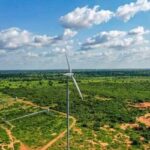Gbenro Tolulope was just a teenager when climate change shifted from distant stories to a reality that hit home. Her mother would share accounts of flooding in their house, but to young Tolulope, it all seemed abstract. “My mind couldn’t comprehend it,” she recalls. “I couldn’t see it in motion pictures or colours, no matter how hard I tried.”
That perception changed one rainy morning when water inundated their compound, rising steadily into their house. Standing by the window, Tolulope watched helplessly as it soaked their living room and crept towards the electrical outlets. She panicked, fearing the potential danger of electricity mixing with the floodwaters. Acting quickly, she donned rubber boots and switched off the power. Hours later, when the rain finally subsided, the flood had left their home in disarray—and Tolulope with a new understanding of climate impact.
Growing up, Tolulope felt a strong sense of duty to help others, imagining herself in roles like a teacher or a nurse. She found herself drawn to serve and protect her community, an instinct she actively nurtured. Her journey took an unexpected turn when she deferred admissions to two prestigious U.S. universities in favour of Nigeria’s Covenant University. Disappointed with this decision, she initially struggled with sadness and resentment. But depression, though challenging, ultimately became a crucible for change.
Amid her difficulties, Tolulope stumbled upon Enactus, a student organisation focused on addressing global challenges through social entrepreneurship. This meeting marked a turning point, igniting her passion for social impact. She threw herself into volunteering and discovered resilience, critical thinking, and an aptitude for problem-solving.
In her second year, she participated in the Enactus National Competition, where her team won the national round and went on to represent Nigeria at the Enactus World Cup in San Jose, California. This experience exposed her to the world of sustainable development and showed her that social change could be both impactful and practical.
Returning to Nigeria with a new sense of purpose, Tolulope dived into projects focused on climate action. Her work with Enactus introduced her to recycling initiatives, where she led a community project that transformed plastic waste into income-generating opportunities.
One memorable moment saw her riding on a truck filled with plastic bottles—a powerful symbol of her commitment to environmental change. Later, she experimented with converting these bottles into interlocking bricks for school walkways, marrying sustainability with practicality.
As she progressed, Tolulope grew aware of the deep-rooted climate vulnerabilities facing Nigeria. Reflecting on her own flooding experience, she recognized the need for adaptation measures to prepare communities for climate impacts. “Nigeria often overlooks proactive strategies to manage water during floods or to conserve it for drought-prone areas,” she notes. Tolulope calls for policies that support green infrastructure, emphasizing that Nigeria’s development doesn’t need to repeat the environmental pitfalls of industrialised nations.
Beyond grassroots activism, Tolulope has taken her advocacy to the global stage. In 2023, she received a grant from the Nigeria Youth Future Fund to create the “Train the Trainers Program,” a project that equipped 40 teachers with climate education resources, including customised flashcards. This programme has since inspired educators to bring climate awareness into classrooms, fostering a ripple effect across communities.
Tolulope’s dedication extends to international policy advocacy, with initiatives like the African Youth Mobilisation for COP (AYM4COP), where she co-created the African Youth Climate Action Plan. Presented at international climate forums, the plan amplifies African youth voices and advocates for policies responsive to regional climate needs.
Tolulope’s journey hasn’t been without its challenges. As a young professional, she has encountered bias based on her age, often finding that her expertise is undervalued. “People appreciate expertise,” she says, “but often want to compensate as little as possible for it.” She is candid about the need for fair compensation for young professionals in climate work, advocating for policies that recognise the value of youth-driven change.
Reflecting on Nigeria’s Climate Change Act, Tolulope offers a critique of its focus on private-sector accountability, arguing that public-sector emissions should also be monitored. Policy development is one thing, but implementing sustainable frameworks is key, she insists. Her call to action is for a balanced, accountable approach that includes both private and public sectors.
A Vision for Lasting Impact
Tolulope advises other aspiring changemakers to “start with purpose, document everything, and focus on genuine impact.” For her, every step—whether volunteering, consulting, or project management—adds to a cumulative experience that fuels her vision for the future. Today, as Director of Monitoring and Evaluation at the Youth Sustainable Development Network, Tolulope’s journey reflects resilience, purpose, and an unwavering commitment to creating a sustainable world.
Her work underscores that climate action is a shared responsibility, one that requires local communities, policymakers, and global leaders to act decisively. In Tolulope’s story, her personal challenges have shaped her into a leader ready to make lasting change.
Gbenro Tolulope's journey from a teenager witnessing the direct impact of climate change on her home to becoming a committed climate action advocate is both inspiring and transformative. Her first-hand experience with flooding propelled her understanding of climate impact, igniting her passion for environmental change. Tolulope embraced her calling by immersing herself in social entrepreneurship via Enactus, participating in national and international competitions, and leading community projects that repurposed plastic waste into practical solutions.
Her work in Nigeria highlighted the need for adaptive strategies and green infrastructure to combat climate vulnerabilities. Tolulope's efforts transcended local activism, leading her to establish the "Train the Trainers Program" which equips educators with climate education tools, consequently embedding climate awareness into school curriculums. She also played a vital role in the international advocacy scene through her contributions to the African Youth Climate Action Plan.
Tolulope calls for fair compensation for young professionals in climate efforts and critiques Nigeria's Climate Change Act for its private-sector focus, urging for a balanced accountability that includes public-sector emissions. As a youth leader and the Director of Monitoring and Evaluation at the Youth Sustainable Development Network, her dedication emphasizes that climate action is a collective responsibility involving local and global stakeholders in making substantial, enduring change.






